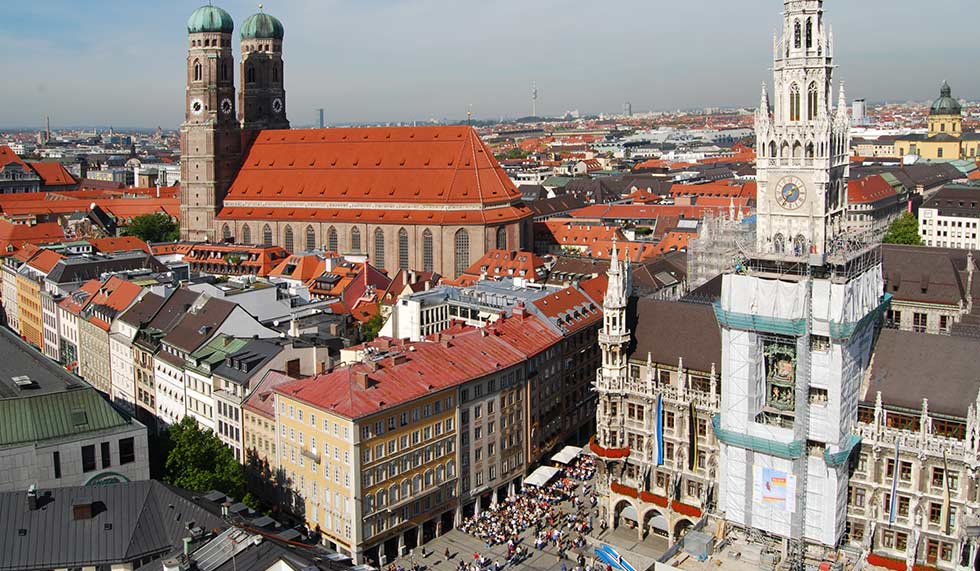
Overview: Munich, Germany
The City of Munich is located close to the Bavarian Alps in the centre of Europe.
Munich offers plenty of accommodation types, among them about 345 hotels and pensions with nearly 40,000 hotel beds. With 1.4 million arrivals from abroad Munich is the leading destination for foreign visitors in Germany.
Munich international airport can be reached directly from many cities in world and certainly from major airports in the USA.
The Oktoberfest is the largest beer and folk festival in the world and nearly 6 million visitors are flocking to this event late September each year. Stroll through historical pedestrian zones, enjoy a metropolitan nightlife, and a rich cultural program.
Sightseeing — Munich’s top attractions
See our article: Munich — must-see attractions
Travel Season / Climate & Temperatures
Best time to travel / Season
Year-round:
Summer: explore the city, its parks, its pedestrian friendly downtown, many festivals, beer gardens, …
Winter: beside discovering the city in winter, which is great to visit castles, museums, and many other things, visitors who like skiing can reach the skiing areas in approx. 1-2 hrs by car (e.g. Garmisch-Patenkirchen).
Climate and Temperatures
Munich is located in a moderate climatic zone and therefore has neither an extremely cold winter or an extremely hot summer.
January: between freezing point and 62 F (averages up to 16.9 C)
May: highs in the mid 80’s F (averages up to 29.7 C)
June August: highs in the 90’s (averages up to 33.7 C)
Precipitation (2002): 1118 mm
Sunshine duration (2002): 1856 hours.
Average temperatures in Germany
Juli/August: between 68 and 86 F (20 – 30 C)
Winter: average around 32 F (0 C)
Visitor Info & Getting around
Population
1,31 million (2009 according to the ‘Landeshauptstadt München’)
Airport
Franz-Joseph Strauss International Airport, Halbergmoos north of Munich
Can be reached via public transportation: S-Bahn (regional train) from/to Downtown
Website: www.munich-airport.com
Public Transportation
MVV – Münchner Verkehrs- und Tarifverbund
Transportation Authority for Subway, Bus, Tram (like trolley), S-Bahn (regional trains)
Public transportation is the best way to discover the city — it is easy to use and common among locals. It is generally considered safe to travel on public transportation, even during late hours, of course, common sense safety awareness is required. You may choose between several ticket options, ranging from Single Ride tickets, over Stripe Tickets (multiple rides on one card) to Day Tickets or bundled day tickets for tourists which include discounts for attractions. Check out their website and look for the ticket section which explains all the options.
Website: www.mvv-muenchen.de/en/
Education and culture
In Munich there are 11 universities with approx. 84.361 students, 56 theatres including one opera house, 3 large orchestras, 46 museums and collections, 139 public libraries, 76 cinemas.
Tourist Offices
Main Train Station
Bahnhofsplatz 2
Open: April-October: Mon-Sat 9am to 8pm, Sun and 26.12. 10am to 6pm.
25.12. and 1.1. closed
24.12. and 31.12.: 9am to 4pm
Marienplatz
at Neues Rathaus City
Open: Mon to Fri 10am to 8pm, Sat 10am to 4pm, Sun 10am to 1pm and 2pm to 5pm.
24th/31st Dec. 10am to 2pm
Closed on holidays.
From 27th Nov to 24th Dec there is another tourist information booth open:
Christmas Market
Open: Mon-Fri 10am to 8pm, Sat 10am to 5pm, Sun 10am to 4pm
(Closed on the following holidays: Jan 1st and 6th, May 1st, Nov 1st, Dec 25th and 31st)
Location
The City of Munich is located close to the Bavarian Alps in the centre of Europe. The River Isar flows through the town. Total area of the city: about 31,000 hectars (76,543 acres); lowest point: 482 metres (1,582 feet) above sea level; highest point: 579 metres (1,901 feet) above sea level. Isar: 13.7 km (approx. 10 miles) long in the city area.
Map
Brief History of Munich
Munich was founded in 1158 and was given the status of a town (civitas) in 1214. In 1255 Munich became the seat of the Wittelsbach dynasty. In 1632 it was occupied by Gustavus Adolphus of Sweden in the Thirty Years’ War. Under King Ludwig I (25.8.1786 29.2.1868) famous buildings were erected the Glyptothek, the Old and New Pinakotheks, the Royal Residence, the Feldherrnhalle, Siegestor (Triumphal Arch) etc. thus turning Munich into a major cultural centre in Europe. On 7th November 1918 Kurt Eisner proclaimed the Free State of Bavaria. In 1957 Munich’ s millionth inhabitant was born. In 1972 the XX. Olympic Summer Games were held at Munich.
Interested in learning more about Munich?
All our Munich-related articles are located under the TAG Munich: Munich, Germany

